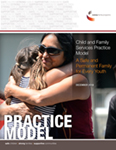
Creating a better future for children and families in a time of crisis
Our 2020 special report highlights how communities are innovating to respond to the tremendous impact of COVID-19 on children and families.

Our 2020 special report highlights how communities are innovating to respond to the tremendous impact of COVID-19 on children and families.
Learn the findings from a study that examined how kinship navigation services can support families and improve outcomes for children.
Explore strategies that establish a kin-first philosophy to prioritize kinship care for children and support relative caregivers.
Learn how the policies and practices of A Second Chance Inc. have helped advance kinship care and improved outcomes in Allegheny County.
Understand the importance of a kin-first culture and strategies for child protection agencies to prioritize and support kinship caregivers.

This report explores permanency outcomes for youth who, when referred to Casey services, were not residing with a family member.
This brief discusses challenges that agencies may face serving families that lack lawful immigration status, and strategies to address them.
Learn how Allegheny County achieved a kin-first culture shift in this Q&A with Marc Cherna, director of Department of Human Services.

This data overview looks at trends for American Indian/Alaska Native children in care nationally, and in California and Washington.

This practice model outlines strategies and interventions that advance Casey Family Programs’ focus on permanency for youth.